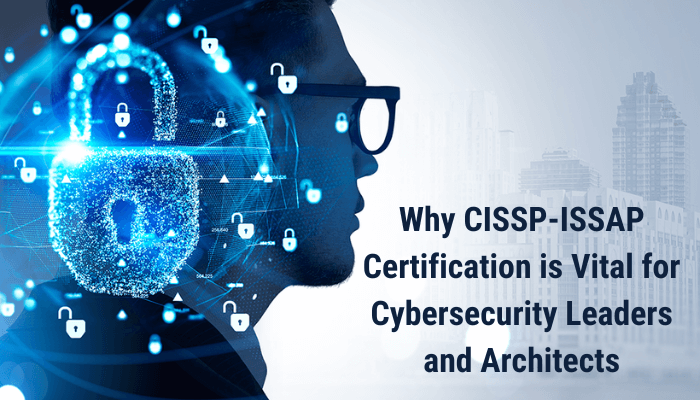The CISSP-ISSAP (Certified Information Systems Security Professional – Information Systems Security Architecture Professional) certification is a specialized certification offered by the International Information System Security Certification Consortium (ISC)².
The CISSP-ISSAP certification focuses on the knowledge and skills necessary to design and develop secure information systems architecture. It is designed for experienced professionals with a background in information security interested in pursuing a career in information systems security architecture.
To obtain the CISSP-ISSAP certification, candidates must have at least two years of professional experience in architecture and five years in information security. They must also pass an examination that covers six domains: security architecture analysis, security architecture modeling, security capabilities of information systems, security architectures, security technology, and security operations.
Holding a CISSP-ISSAP certification demonstrates a high level of expertise in information security architecture and enhances career opportunities in this field.
CISSP-ISSAP Certification Requirements
To earn the CISSP-ISSAP certification, candidates must meet the following requirements:
- Professional Experience: At least two years of professional experience in architecture and five years in information security is required.
- Endorsement: A candidate must be endorsed by another (ISC)² certified professional who can attest to the candidate’s professional experience.
- Examination: The candidate must pass the CISSP-ISSAP examination, which consists of 125 multiple-choice questions based on the six domains of the CISSP-ISSAP Common Body of Knowledge (CBK).
- Code of Ethics: The candidate must agree to abide by the (ISC)² Code of Ethics.
- Continuing Professional Education (CPE): The candidate must earn and submit at least 20 CPE credits each year and 120 CPE credits over three years to maintain their certification.
The CISSP-ISSAP certification is a highly respected and specialized certification demonstrating a candidate’s expertise in information security architecture. Meeting these requirements and earning the certification can help professionals advance in their careers and increase their earning potential.
CISSP-ISSAP Exam Format
The CISSP-ISSAP certification exam consists of 125 multiple-choice questions and is based on the six domains of the CISSP-ISSAP Common Body of Knowledge (CBK):
- Architect for Governance, Compliance and Risk Management (17%)
- Security Architecture Modeling (15%)
- Infrastructure Security Architecture (21%)
- Identity and Access Management (IAM) Architecture (16%)
- Architect for Application Security (13%)
- Security Operations Architecture (18%)
The exam is four hours long and is administered in a computer-based format. Candidates must achieve a minimum score of 700 out of 1,000 points to pass the exam.
Study Resources for CISSP-ISSAP Exam
Several study resources are available for candidates preparing for the CISSP-ISSAP certification exam. These include:
- Official (ISC)² Study Guide: The official study guide published by (ISC)² covers all six domains of the CISSP-ISSAP Common Body of Knowledge (CBK) and provides detailed information on the exam format, content, and scoring.
- (ISC)² Online Training: (ISC)² offers online training courses that cover the exam’s content and provide interactive learning experiences.
- Practice Tests: Several practice tests are available that simulate the actual exam experience and allow candidates to test their knowledge and identify areas where they need to improve.
- Study Groups: Joining a study group can help prepare for the exam as it provides opportunities for discussion and collaboration with other candidates.
- Books: Several books are available that cover the exam’s content and provide additional study materials.
- Practice Tests: The CISSP-ISSAP practice tests provide an opportunity to practice with questions similar to those found on the exam.
Candidates should choose the study resources that best meet their learning styles and needs. It is essential to give themselves sufficient time to prepare for the exam and to focus on understanding the concepts and principles rather than simply memorizing facts.
Tips for Exam Preparation
Here are some tips to help candidates prepare effectively:
- Understand the Exam Format and Content: Candidates should familiarize themselves with the exam format and content by reviewing the (ISC)² Study Guide and other available resources.
- Develop a Study Plan: Candidates should develop a study plan with a timeline for reviewing the content and practicing with practice tests. It is essential to allocate sufficient time for each domain and to focus on areas where the candidate needs improvement.
- Use Multiple Study Resources: Candidates should use various study resources, including books, practice tests, online training, and study groups, to reinforce their understanding of the content.
- Apply the Concepts to Real-World Scenarios: Candidates should practice applying the concepts they learn to real-world scenarios to help them understand how the concepts are used in practice.
- Take Breaks and Manage Stress: Studying for the exam can be stressful, so candidates should take breaks and practice stress management techniques to stay focused and avoid burnout.
- Practice Time Management: Candidates should practice time management techniques during their exam preparation to ensure they can complete the exam within the allotted time.
- Stay Up-To-Date: Candidates should stay up-to-date with the latest developments and trends in information security architecture by reading industry publications and attending conferences and events.
Common Mistakes to Avoid During Exam
The CISSP-ISSAP exam is challenging, and candidates must be aware of common mistakes that can reduce their chances of success. Here are some common mistakes to avoid during the exam:
- Focusing On Memorization Instead of Understanding: Candidates should focus on understanding the concepts and principles of security architecture instead of simply memorizing facts. The exam requires the application of knowledge to real-world scenarios.
- Not Managing Time Effectively: Candidates should manage their time effectively during the exam to ensure they can answer all the questions within the allotted time. They should avoid spending too much time on one question and leave enough time to review their answers.
- Not Reviewing Answers: Candidates should review their answers before submitting the exam to ensure they have avoided making mistakes or missing questions.
- Overthinking or Second-Guessing: Candidates should trust their knowledge and instincts when answering questions and avoid overthinking or second-guessing themselves.
- Neglecting to Mark Questions for Review: Candidates should mark questions they need clarification on or want to review later. This will help them spend less time on one question and ensure they have enough time to review all the questions before submitting the exam.
Career Opportunities with CISSP-ISSAP Certification
The CISSP-ISSAP certification can open up various career opportunities for information security professionals. Here are some potential career paths that can be pursued with this certification:
Security Architect
As a CISSP-ISSAP certified professional, you have the knowledge and skills to design and implement secure information systems and networks. This makes you an ideal candidate for roles such as Security Architect, where you can lead the design and implementation of security solutions for organizations.
Security Consultant
With your in-depth understanding of security architecture principles, you can also work as a Security Consultant, helping organizations identify security risks, assess their security needs, and develop and implement security strategies.
Security Manager
CISSP-ISSAP certification can also prepare you for a role as a Security Manager, where you can oversee and manage security operations, develop security policies and procedures, and ensure compliance with regulatory requirements.
Cybersecurity Analyst
As a CISSP-ISSAP certified professional, you can also pursue roles such as Cybersecurity Analyst, where you can analyze security threats and vulnerabilities, develop and implement security solutions, and monitor and report on security incidents.
Salary Potential for CISSP-ISSAP Certified Professionals
The salary potential for CISSP-ISSAP-certified professionals varies depending on the industry, experience, location, and job role. However, on average, CISSP-ISSAP-certified professionals can expect to earn higher salaries than their non-certified counterparts.
According to the latest data from PayScale, the average salary for a CISSP-ISSAP-certified professional is around $135,000 per year in the United States. However, this figure can vary significantly based on job role, industry, and location. For example, CISSP-ISSAP certified professionals in leadership roles such as Chief Information Security Officer (CISO) or Security Architect can command higher salaries than those in more junior positions such as Cybersecurity Analyst or Security Consultant.
Additionally, the demand for CISSP-ISSAP-certified professionals is growing as more organizations recognize the importance of information security in today’s digital landscape. This increased demand can lead to higher salaries and better career opportunities for certified professionals.
Overall, the CISSP-ISSAP certification can significantly boost earning potential of information security professionals and help them pursue high-paying roles in the field.
Conclusion
The CISSP-ISSAP certification is a highly regarded credential in information security. To prepare for the certification exam, candidates can utilize various study resources and follow tips such as focusing on the domains with the highest weightage, avoiding common exam mistakes, and practicing time management. Overall, the CISSP-ISSAP certification can be a valuable investment for information security professionals seeking to advance their careers and stay current with the latest developments in the field.




